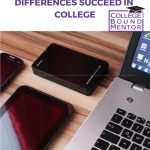Technology Helps Students With Learning Differences Succeed in College
by Jennifer Schneider

Technology has made it easier for students with learning differences to succeed in college.
I attended the Life After High School and Post-Secondary Expo sponsored by the Learning Disabilities Association of New Jersey. While the workshops and expo explored many opportunities and resources for students as they transition from high school, I was most impressed with the constantly improving adaptive technology being offered at the college level.
Writing
Many students have a hard time taking notes or getting their ideas down on paper. There are several adaptive pencils, smartpens, grips, keyboards, word prediction programs/apps, and voice recognition technology to help.
- Livescribe acts like a ballpoint pen, but this smartpen automatically syncs to any number of devices and saves your notes.
- Texthelp helps students read and write with an online subscription that connects to any device.
Reading
There are also numerous tools out there to help students with dyslexia or English Language Learners who may have a harder time reading. They include large print materials, readings guides, electronic dictionaries, audio books, talking digital books, and scan and read technologies.
- Learning Ally provides mentors and curriculum to help students with disabilities. It also provides audio books.
- Kurzweil is a great option to help translate text to speech.
Math
For students who struggle with Dysgraphia, a neurological disorder characterized by writing disabilities, math sequences can be extremely challenging. Apple partnered with Christopher’s Way Foundation, an organization established to provide awareness about this disorder and developed two apps specifically targeting students with developmental and neurological delays.
- ModMath allows students to type math problems right onto the touchscreen of an iPad rather than write them out long-hand.
- Talking Calculator provides the option to use speech for answers, button names, and even formulas!
Physical Disabilities
Adaptive keyboards and mouse alternatives are excellent examples of adaptive technologies used by college students with physical disabilities. This is because for visual and hearing impairments, apps and digital materials provide usable content.
- One handed and Braille keyboards allow students to work around their physical limitations.
- Computer Aided Real-Time Transcription (CART) provides access to spoken communication for students who are deaf, or who have certain learning impairments.
Final Thoughts
All in all, technology has made the transition to college much easier for students with learning and physical disabilities. Students should explore these supports and make sure to take advantage of them once on campus. Make an appointment and start planning now for your success. The Office of Disability Services is always happy to assist accordingly.

